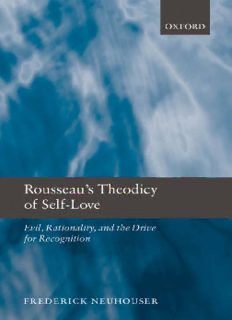
Rousseau's Theodicy of Self-Love: Evil, Rationality, and the Drive for Recognition PDF
Preview Rousseau's Theodicy of Self-Love: Evil, Rationality, and the Drive for Recognition
Rousseau’s Theodicy of Self-Love This page intentionally left blank Rousseau’s Theodicy of Self-Love Evil, Rationality, and the Drive for Recognition Frederick Neuhouser 1 1 GreatClarendonStreet,Oxfordox26dp OxfordUniversityPressisadepartmentoftheUniversityofOxford. ItfurtherstheUniversity’sobjectiveofexcellenceinresearch,scholarship, andeducationbypublishingworldwidein Oxford NewYork Auckland CapeTown DaresSalaam HongKong Karachi KualaLumpur Madrid Melbourne MexicoCity Nairobi NewDelhi Shanghai Taipei Toronto Withofficesin Argentina Austria Brazil Chile CzechRepublic France Greece Guatemala Hungary Italy Japan Poland Portugal Singapore SouthKorea Switzerland Thailand Turkey Ukraine Vietnam OxfordisaregisteredtrademarkofOxfordUniversityPress intheUKandincertainothercountries PublishedintheUnitedStates byOxfordUniversityPressInc.,NewYork ©FrederickNeuhouser2008 Themoralrightsoftheauthorshavebeenasserted DatabaserightOxfordUniversityPress(maker) Firstpublished2008 Allrightsreserved.Nopartofthispublicationmaybereproduced, storedinaretrievalsystem,ortransmitted,inanyformorbyanymeans, withoutthepriorpermissioninwritingofOxfordUniversityPress, orasexpresslypermittedbylaw,orundertermsagreedwiththeappropriate reprographicsrightsorganization.Enquiriesconcerningreproduction outsidethescopeoftheaboveshouldbesenttotheRightsDepartment, OxfordUniversityPress,attheaddressabove Youmustnotcirculatethisbookinanyotherbindingorcover andyoumustimposethesameconditiononanyacquirer BritishLibraryCataloguinginPublicationData Dataavailable LibraryofCongressCataloginginPublicationData Dataavailable TypesetbyLaserwordsPrivateLimited,Chennai,India PrintedinGreatBritain onacid-freepaperby BiddlesLtd.,King’sLynn,Norfolk ISBN978–0–19–954267–3 10 9 8 7 6 5 4 3 2 1 for Jason This page intentionally left blank Acknowledgments Somanyindividualsandinstitutionshavehelpedmetowritethisbookthat it is impossible to acknowledge them and their contributions adequately. Mylargestdebtistothenumerousgraduateandundergraduatestudents— at Barnard College, Columbia University, Cornell University, and the J. W. Goethe-Universita¨t, Frankfurt—who have endured my attempts to work out my thoughts on Rousseau in seminars and lectures and who, in many cases, have decisively improved them. Thanks are also due to my many colleagues at the same institutions who have discussed, criticized, and most of all, supported this project. The secondary work that has most significantly influenced my thinking on Rousseau is N. J. H. Dent’s path-breaking Rousseau, which opened my eyes to both the complexity and the philosophical importance of the ideas I discuss here. Two other works that treat amour-propre with unusual clarity and insight and that deserve to be read in conjunction with this book are Andrew Chitty’s doctoral dissertation, ‘Needs in the Philosophy of History: Rousseau to Marx’, and Laurence D. Cooper’s Rousseau, Nature, and the Problem of the Good Life. OranMokedconscientiously checkedthebook’smanyfootnotes, made helpful suggestions regarding my translations from the French, and, most important,significantlyimprovedthebook’sphilosophicalcontentthrough his comments on an earlier draft. I am also indebted to the hundreds of individuals throughout the world who have heard various versions of these ideas in colloquia and lectures and responded to them with patience, persistence, and critical insight. I am especially grateful to audiences at BarnardCollege,ColumbiaUniversity, Princeton University, theUniver- sity of Cambridge, the University of Arizona, the University of North Carolina, the University of Illinois-Chicago, Reed College, the Uni- versity of Toronto, Brown University, the Johns Hopkins University, Northwestern University, the University of Pennsylvania, Sarah Lawrence College, the Rockefeller Foundation in Bellagio, Italy, the Columbia University Seminar on Psychoanalysis and Philosophy, and, in Germany, viii acknowledgments the Universities of Frankfurt, Halle, and Gießen. I also received generous financial support, without which the book could not have been written, from Barnard College, Cornell University, the Cornell University Society for the Humanities, and the Rockefeller Foundation. ToJasonHillIoweadebtthatextendsfarbeyondtheintellectualcontri- butionshemadetothisbook.Countlesstinyinstallmentsofit—usuallythe meagerresultsofaday’swork—werereadaloudtohimonanalmostdaily basis. The book has benefited immeasurably from his insight, criticism, and encouragement. Even more important, the happiness and well-being of its author—preconditions of the book’s existence—depended in large measure on his presence and love throughout the eight years in which it was written. Finally, I want to thank the administrators of Barnard College, as well asmycolleaguesthere,for providing mewithanintellectual and‘spiritual’ home after many years in which I was without one. Among other things, they have taught me how sweet, beneficent, and stimulating—all at once—‘rule by women’ can be. Rousseau, for whom finding precisely this combination was a lifelong psychosexual problem, would surely have appreciated the value of this gift. Contents Abbreviations of Works Cited x Introduction 1 I. Human Nature and its Passions 27 1. The Nature of Amour-propre 29 II. Diagnosis 55 2. The Dangers of Amour-propre 57 3. TheVarieties of Inflamed Amour-propre 90 4. Why Inflamed Amour-propre IsSo Common 117 III. Prescription 153 5. Social and Domestic Remedies 155 IV. Elevating Humankind by Curing the Malady from Within 185 6. TheStandpoint of Reason 187 7. Amour-propre’s Role in Forming Rational Subjects 218 Conclusion 265 Bibliography 271 Index 275
Description: